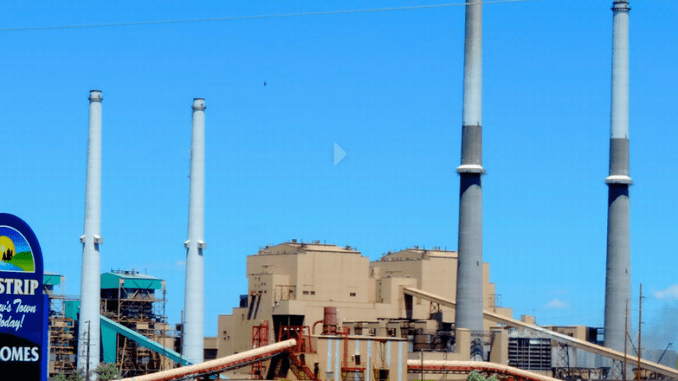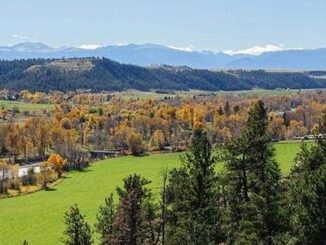
BOZEMAN, Montana, October 31, 2021 (ENS) – In a victory for cleaner water in Montana, a state district court judge has ordered the Montana Department of Environmental Quality, DEQ, to revisit its 2015 permit to expand the Rosebud coal strip-mine owned by Colorado-based Westmoreland Mining.
Judge Katherine Bidegaray in Rosebud County decided that the Montana Board of Environmental Review improperly upheld a permit for Westmoreland to expand its 25,000-acre Rosebud coal strip-mine in eastern Montana’s Powder River Basin along the Montana-Wyoming border.
The judge, who sits on Montana’s 16th Judicial District Court, ruled Thursday that Westmoreland repeatedly ignored the law and failed to protect water quality from an expansion of the Rosebud coal strip mine near Colstrip, one of the largest coal strip mines in the nation. Her ruling halts the planned expansion.
Two environmental groups – Montana Environmental Information Center, MEIC, and Sierra Club – sued over damage to a neighboring creek from the mine’s wastewater.
Western Environmental Law Center, Earthjustice, Roger Sullivan, and Walton Morris represented the plaintiffs.
“The court’s well-reasoned decision concludes that DEQ’s excuses for failing to protect Montana’s water don’t, in fact, hold water,” said Shiloh Hernandez, an attorney with Earthjustice, the law firm that represents the plaintiffs. “DEQ now has a second chance to follow the law. We intend to hold the agency to its legal duty.”
The Montana Strip and Underground Mine Reclamation Act forbids the state from issuing mine permits unless it can be proven there will not be damage to the balance of water outside the permit area.
Yet, for years the plaintiffs argued, East Fork Armells Creek, which runs nearby, has received salty water from the mine and pollutants from coal ash ponds at the power plant. The creek is so polluted that DEQ has deemed it impaired and in violation of state water quality standards.
By law, when a creek is impaired, DEQ cannot allow more pollution into the creek until it prepares a plan to clean it up. DEQ ignored this duty when it approved an expansion of the Rosebud strip mine that, DEQ itself found, would extend the creek’s impairment for “tens to hundreds of years.”
“Clean water is our lifeblood here in Montana,” said Summer Nelson, Director of Sierra Club’s Montana Chapter. “The proposed expansion of the Rosebud coal mine would increase existing stream pollution and simply fail to protect vulnerable aquatic life from more pollution.”
The Rosebud strip mine is polluting Montana’s East Fork Armells Creek. The court found that DEQ and the Board of Environmental Review ignored existing contamination in the creek, failed to consider the impacts from other mine expansions on that same creek, and illegally forced the public to prove that the mine expansion would harm water quality instead of requiring the mining company to prove that it would not harm water quality.
While Westmoreland has not immediately responded to the ruling, the company’s website lists numerous safety and environmental awards it has won from 1985 through 2011.
“Once again, the state agency that is charged with protecting water quality chose to protect a mining company that has been polluting area waters for decades,” said Anne Hedges, director of Policy for the Montana Environmental Information Center. “High levels of salts in water are harmful to agriculture and the environment. Yet DEQ allowed a substantial increase in salt levels in a water body that is already overloaded with salts. Montana’s waters and the people who rely on them deserve better.”
“DEQ has spent the last decade protecting a polluter at the expense of all of those who rely on the waters of Montana,” Hedges argued.
Meanwhile, earlier this month, DEQ reached a settlement for groundwater contamination caused by leaking coal ash ponds at the neighboring power plant, with the operator of the Colstrip Steam Electric Station, Talen Montana, LLC.
DEQ would clean up the contamination though excavation of coal ash from the existing pond area and placement of the ash into a new, lined landfill on Talen Montana’s property, located above the water table and outside the footprint of the current coal ash ponds. The remedy includes additional dewatering components and a flushing/capture well network to further address groundwater contamination.
In June, the DEQ approved financial assurance for this remedy in the amount of $163.3 million, an amount the state agency says “secures adequate resources” for the cleanup.
The town of Colstrip, population about 2,200, receives its water from Castle Rock Lake that is filled with water pumped from the Yellowstone River. Based on available sampling, there is no indication that the contamination has entered the public water supply, according to DEQ, although the agency admits that historically, “private wells in the area have experienced contamination.”
Featured image: The Colstrip Steam Electric Station was designed to burn coal from the Rosebud coal strip-mine. (Photo courtesy WildEarth Guardians)
© 2021, Environment News Service. All rights reserved. Content may be quoted only with proper attribution and a direct link to the original article. Full reproduction is prohibited.



